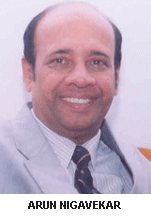 During the first 100 days since he was appointed Union human resource development minister of the Congress-led UPA-2 government, Kapil Sibal promised three urgent reform initiatives in higher and professional education. Among them: creation of an umbrella organisation superseding supervisory organisa-tions such as UGC (University Grants Commission), AICTE (All India Council for Technical Education), NCTE (National Council for Teacher Education) and the Distance Education Council; and formulation of a legal structure permitting foreign universities to establish campuses on Indian soil.
During the first 100 days since he was appointed Union human resource development minister of the Congress-led UPA-2 government, Kapil Sibal promised three urgent reform initiatives in higher and professional education. Among them: creation of an umbrella organisation superseding supervisory organisa-tions such as UGC (University Grants Commission), AICTE (All India Council for Technical Education), NCTE (National Council for Teacher Education) and the Distance Education Council; and formulation of a legal structure permitting foreign universities to establish campuses on Indian soil.
A Bill to establish a National Council for Higher Education and Research (NCHER) and another Bill for regulating the operations of foreign universities were scheduled to be debated in the winter session of Parliament. But unfortunately the HRD ministry has been too hasty. It appointed a core group to draft the Bills; hurriedly got them vetted by the law ministry and passed them on to the parliamentary affairs office for inclusion in the winter session. But all this haste has made waste since the PMO (prime minister’s office) has returned them to the ministry with a suggestion to initiate more intensive consultations countrywide.
The minister’s third initiative of revising the process of sanctioning deemed-to-be universities also seems set to become an exercise in futility. Deemed universities attracted attention after the media caught two principals of engi-neering colleges in Chennai on camera demanding — and getting — capitation fees, thus exposing the open secret of deemed universities. Therefore it came as no surprise that the minister asked UGC to critically inspect all of the country’s 127 deemed universities, and the commission promptly went the whole hog in this exercise by sending dozens of experts to each deemed varsity for detailed investigations.
However, despite this being a massive exercise, media reports indicate that in a short span of time more than 70 deemed universities have been inspected by UGC teams. But unfortunately, the inspection teams restricted themselves to the collection and verification of statistics relating to infrastructure rather than investigating their admission processes, the logic of their fee structures, and the quality of education they deliver. The net result of this elaborate and misdirected exercise is that the UGC committee reports indicate that all is well with deemed universities.
Fortunately the HRD ministry got wind of the ineffectiveness of this UGC exercise and promptly appointed another review committee under the chairmanship of Prof. Goverdhan Mehta, former director of the Indian Institute of Science, with three other eminent persons — Dr. T.R. Tandon, Dr. Aanadkrishanan and Dr. Mrinal Miri — as members. With the two committees working parallely, the ministry asked UGC to complete the entire exercise for all deemed universities, and submit a comprehensive report. But this hasn’t happened, with the UGC submitting reports in batches to the ministry.
Meanwhile the Mehta Committee, which investigated the academic, research, financial and governance mechanisms of deemed universities in great detail, has submitted its report. According to informed sources, the Mehta Committee report indicates that more than 40 deemed universities don’t deserve varsity status. However the Mehta Committee has also declared that 38 deemed universities have excellent academic infrastructure.
These two contradictory reports have placed the HRD ministry in a quandary. While the ministry appointed Mehta Committee highlights the weaknesses of deemed varsities, the UGC reports give a mirror opposite picture. And given that deemed status to any institution is conferred by the HRD ministry on UGC’s recommendation (which in turn relies on the recommen-dations of AICTE and other professional councils), any action taken against them has to be linked with UGC reviews. Thus from the legal angle, the ministry cannot ignore the UGC review committees’ reports. If the ministry does so, aggrieved varsity managements are likely to take legal recourse and challenge the appointment of the Goverdhan Mehta committee.
All this confusion raises disturbing questions. Weren’t HRD officials aware of the correct legal position? It is difficult to believe that they weren’t aware that an independent probe of deemed varsities commissioned by the ministry would generate controversy. In the circumstances, why did they advise the ministry to appoint the Mehta Committee instead of asking UGC to do the review with greater focus?
Reforms in higher education are a complex process and certain to be resisted from within and outside the system. If the HRD minister is serious about reform as he claims to be, it’s imperative to induct like-minded officials into the ministry and appoint enlightened academics on various councils and commissions. The minister needs people who don’t have secret agendas positioned at strategic points within the higher education system, to facilitate the reforms process. This is a necessary pre-condition of meaningful reforms in higher education. The sooner this is done, the better for the future of higher and technical education in 21st century India.
(Dr. Arun Nigavekar is former chairman of the University Grants Commission)